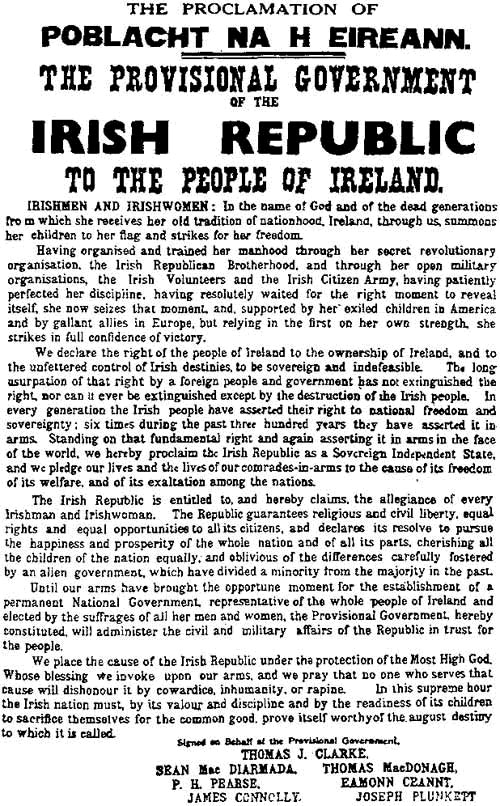 The 2014 London commemoration of the 98th anniversary of the Easter Rising in Ireland, organised by the London branch of Republican Sinn Fein, and attended by a wide range of independent Republicans, communists and anti-imperialists was the best attended commemoration event in recent years.
The 2014 London commemoration of the 98th anniversary of the Easter Rising in Ireland, organised by the London branch of Republican Sinn Fein, and attended by a wide range of independent Republicans, communists and anti-imperialists was the best attended commemoration event in recent years.
The Easter proclamation was read out, as was the Roll of Honour of Republicans from London who gave their lives to the struggle, followed by the lowering of flags and a minute’s silence.
Many of the speakers condemned Sinn Fein’s Martin McGuiness, for meeting once again with the Queen of England. It is even rumoured she has been invited to the centenary commemoration of the Rising in Dublin in 2016.
The General Secretary of the Irish Republican Prisoners’ Support Group read out two messages from prisoners.
The first was from Gavin Coyle, who has been kept in solidarity confinement at Maghaberry prison since 2011:
‘… after 14 days of interrogation at the hands of the British Armed Forces, namely RUC/PSNI. They attempted to recruit me as an informer which I refused… During the first six months there were numerous attempts from both RUC/PSNI and MI5 to recruit me as an agent. I will never bend my knee and that’s why the torture continues!’
A long statement was then read from the Public Relations Officer of the E2 landing prisoners at Portlaoise prison, which reaffirmed ‘our commitment to the progressive ideals which inspired the 1916 leaders and which inspire us still: the idea of an Ireland free from foreign interference; the creation of socially and economically just society; the provision of free universal healthcare and education for all and the promotion and revival of the Irish language’.
‘An objective analysis of Irish history illustrates that a section of the Irish people will militarily confront the British state for as long as Britain remains in Ireland. They will do so not out of some blind allegiance to armed actions but out of a deep conviction that constitutional politics will never deliver our right to national self-determination.’
In the 26 Counties, both Eirigi and the Republican Network for Unity (RNU) used their Easter events to celebrate the roll of women in the Republican struggle. 2014 is the 100th anniversary of Cumann na mBan, the women’s section of the IRA.
Eirigi statement (read out by Stephen Murney, recently released from two years’ internment):
‘In this centenary year of the formation of Cumann na mBan, it is right that we salute and honour all those women who, across many generations, have played a part in our national liberation struggle. In that respect, it is correct that we acknowledge and send solidarity to those women who are currently imprisoned in Ireland for their political beliefs – women such as Ursula Ní Shionnain in Limerick gaol and Sharon Rafferty, Christine Connors and Nuala Gormley in Hydebank.’
‘When Mairéad Farrell stated that Irishwomen had been oppressed both as women and as Irish people, she spoke an undeniable truth. It is always worth reminding ourselves that women’s participation in the Republican struggle was not just to achieve national liberation, it was also about the struggle of working-class women for better living conditions, for better working conditions and pay, and for a radical political voice.’
RNU statement:
‘We have embraced again the founding Republican ideals of Liberty, Equality and Fraternity; and by consequence the unashamed ideals of Irish National Liberation and Socialism. Under our watch, socialist principles will not be abused as a smokescreen with which some would abandon the urgent need to free our country, nor will it be the preserve of a pompous minority of intellectuals. It will be the straightforward principled position for those who demand a fair deal for the ordinary man and woman of this country, who currently and shamefully are forced to work for the privilege life styles of the gombeen men of Ireland or the foreign bankers backed by the plundering and heartless forces of Troika and the IMF.’
At a large gathering at the garden of Remembrance in Dublin the 32 County Sovereignty Movement questioned how Republican socialism can be made relevant today:
‘If Connolly could elevate his socialism beyond tradition why can’t we? Why can’t we define our socialism beyond protest and into disciplined political action with a defined national objective? Can we honestly say that the greatest tribute we can pay to James Connolly is to stand at the centenary of his execution and declare ourselves gloriously isolated?’
‘We cannot allow our socialism to be merely a critique of capitalism no more than we can allow our Republicanism to be merely a critique of partition. We are not a protest movement, we are not a debating society, we are not a commemoration committee, and we are a movement who must be defined by the changes we bring about.’
In all this year’s Republican statements there is a new sense of urgency and a realisation that it is not enough just to oppose the GFA on dogmatic historical grounds, that at a time where people on all sides of the divide are struggling to make ends meet, the struggle must be to make a socialist alternative relevant to all peoples of the island, and that this is an opportunity to put Republicanism back at the forefront of class struggle.
John Byrne




